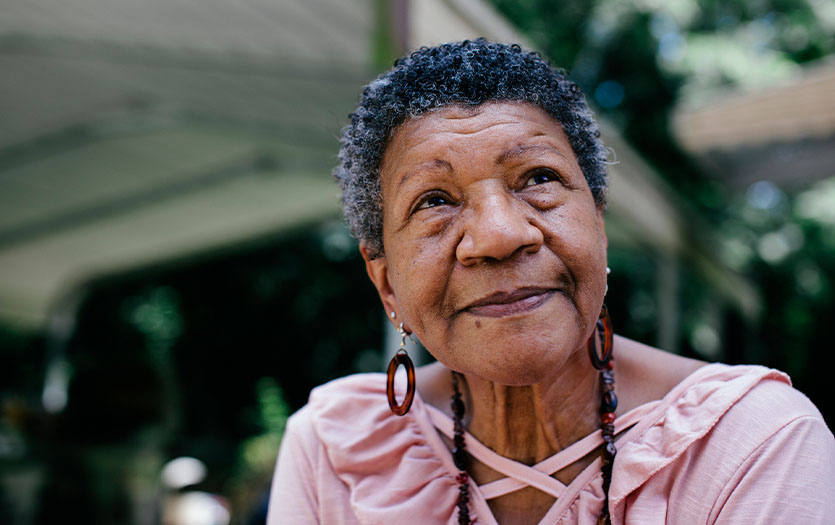
As a champion for advance care planning (ACP), Lisa Knox, MPH, ambulatory care transitions coordination supervisor, Parkview Population Health, is committed to educating others about the value of critical conversations. On National Healthcare Decisions Day, she shares why she’s so passionate about documenting end-of-life care wishes, from both a personal and professional perspective.
How did you first get introduced to advance care planning (ACP)?
I worked in long-term care prior to starting at Parkview in 2015. Through my previous professional experience, I had a foundational understanding of advance directives, though at that point I admittedly was probably still under the false presumption that the documents were for completing “later in life.”
Shortly after joining Parkview’s Population Health (Care Coordination) team, my father-in-law was unexpectedly hospitalized and ended up passing away quite suddenly. He had never completed any advance directives or had conversations with anyone about his end-of-life wishes. I witnessed firsthand the painful impact that “guessing” and making the tough call to discontinue life support had on my husband and his siblings. It made an already difficult situation much, much harder.
It was not long afterwards that my leaders and I learned that Parkview was going to be starting a new initiative around ACP, and we knew that we wanted our team to be a part of it. I personally knew that I wanted in–I already had my “why.”
How do you champion ACP in your current role?
The majority of our Care Coordination team, which includes RNs and social support specialists, has completed ACP Facilitator training, which means that they’re well-equipped to have these important conversations with their patients. We know that ACP is important for all individuals ages 18 and older, regardless of their health status. We have worked to embed ACP as part of the normal culture of care that we provide the patients we’re working with. It’s part of our routine and best practice approach.
I meet with our group of facilitators regularly to discuss progress, goals and opportunities around ACP, and we review these discussions at our one-on-one touch bases. We also spend time sharing advance directives-related updates and brainstorming strategies during our smaller team huddles and larger team meetings. I encourage the facilitators on my team to consider their own “why” as it relates to championing ACP.
What is your motivation to educate others about ACP?
I have both professional and personal experiences that have illustrated and confirmed the immense value of ACP. In addition to serving as a facilitator, I am also a certified ACP instructor. Whether for the sake of ourselves or our families/loved ones, we want to receive care that aligns with our personal values and goals. And from the caregiver’s perspective, we want to honor our patients’ individual health care choices.
Our Care Coordination team is committed to offering patient-centered, comprehensive care. In order to do that to the best of our abilities, patients can’t overlook or disregard the value of making their wishes known. How will people know what you want when it matters, unless you tell them?
What surprises you about ACP conversations with others?
I have been surprised by some of the realizations that have come to light during ACP conversations where a family member or friend has also been present. Many of us assume that having a close relationship with someone automatically translates into a mutual transparent understanding of what matters to each other, what our goals and values are, and what our wishes are for our future health care. But this isn’t always the case. There’s a common mantra that end-of-life care is everyone’s business. We just need to start the conversations.
Why do you think people delay or don’t have ACP conversations?
While death is something that is certain for all of us, it remains a generally uncomfortable topic for many. We simply don’t want to think about it, or we don’t want to talk about it with our loved ones, or we don’t think they would want to talk about it with us, or all of the above. It really is a culture shift to think about embracing the opportunity to talk about end-of-life with our family members and friends (and anyone else who will listen!), rather than avoiding it. I think being able to reframe it with the perspective that ACP is a gift that you can give to those who matter most to you in your life is a big first step. Also, completing ACP is one of the best ways to ensure that an individual remains at the center of their own care, even if a time comes when they are unable to speak for themselves.
How can someone get started with ACP and what can you share about the process?
Individuals can schedule either one-on-one or group ACP discussions with a certified facilitator. The ACP team at Parkview has made it extremely easy to schedule a conversation or even just to learn more about ACP. Anyone who is interested can take the first step by requesting an appointment through their MyChart account or by contacting the ACP team directly.
To set up an appointment via MyChart, go to the drop-down menu button, and select “Advance Care Planning/End-of-Life Planning.” Select the “Schedule Appointment” button to reserve a spot with an ACP facilitator.
To contact the ACP team directly, call 260-266-1481 or email [email protected].
What do you want others to consider on Healthcare Decisions Day?
It’s important for us to communicate “what” we want for future health care/end-of-life, but so often the true value of these actions lies within the “why,” which can look different for everyone. I was able to participate in my mom’s ACP conversation when she was working to appoint me as her Health Care Representative (HCR), and it was such a gift for me to hear her share the “why” behind the “what.” Now I have context to the statements she made about what matters to her and the description of her goals. Because of this, if the time ever comes when my HCR appointment is activated on behalf of my mom, I won’t be guessing what it is that she would want me to do for her, and why. I have the gift of knowing.
Being able to participate in ACP has been so rewarding to me, from every aspect. My husband and I completed our own ACP conversations together, I participated in my mom’s conversation as her appointed HCR, I’ve had the privilege of facilitating many conversations for Parkview patients, and I’ve been able to support the growth of ACP within our health system and local communities as an ACP instructor. I’ve experienced the value of these conversations and it is truly all-encompassing.



